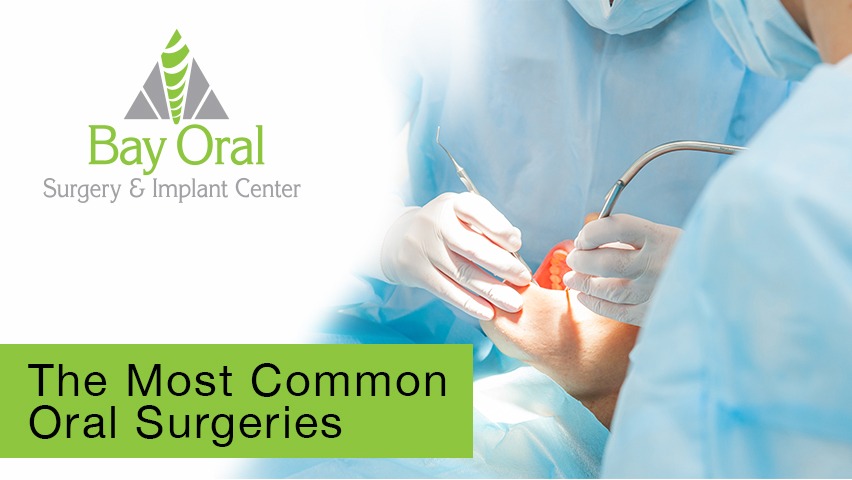
by Bay Oral Surgery | Jul 23, 2019 | Blog

There are many different types of oral surgery, ranging from wisdom teeth extractions to oral biopsies to corrective jaw surgery. Below is a description of the two most common oral surgery procedures.
Dental Extractions
There are three types of dental extraction procedures: simple extraction, surgical extraction, and impacted extraction. When your tooth is easily accessible, your dentist can usually perform a simple dental extraction to remove the tooth. If your tooth is hidden or more difficult to reach, such as a tooth broken off at the gum line, you will most likely require a surgical tooth extraction. An impacted tooth extraction is needed when your tooth fails to pass through the gum tissue due to something preventing its normal eruption, such as another tooth or dense soft tissue. If your tooth fails to emerge, or emerges only partially, it is considered to be impacted, which is the most difficult type of dental extraction.
Dental Implants
Another very common type of oral surgery is when dental implants are used to replace missing teeth. A dental implant is a titanium rod that is anchored directly to the jawbone to provide stability and support for one or more artificial teeth. The dental implant acts as a replacement for the root of a missing tooth to help preserve the natural jawbone, stimulate bone growth, and maintain facial structure. How dental surgery is performed depends on the type of implant and the condition of your jawbone, which an oral surgeon will assess before the procedure.
Request A Consultation
Whatever your oral surgery needs may be, it’s important to review all of your options by meeting with an oral surgeon. If you believe you’re in need of a dental extraction or dental implant, schedule a consultation.
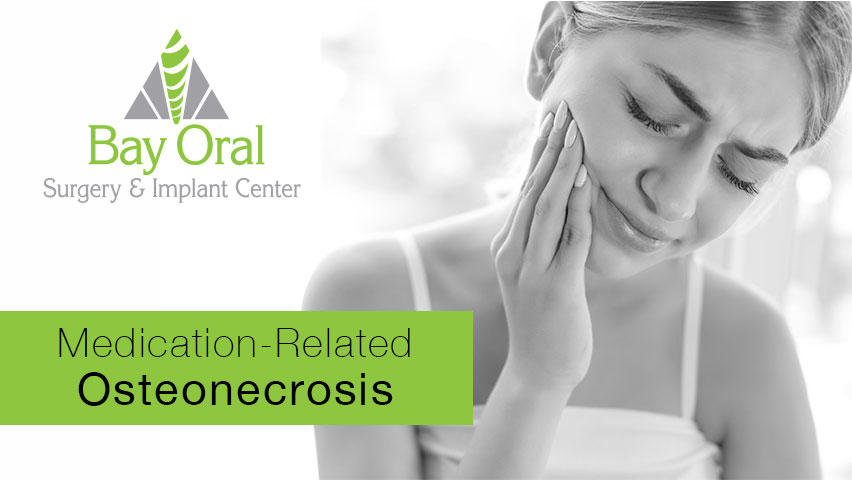
by Bay Oral Surgery | Jun 15, 2019 | Blog

Medication-Related Osteonecrosis of the Jaw (MRONJ) is a condition that patients can experience if they are taking certain medications, such as medications normally prescribed for Osteoporosis. With the advancement of newer medications, additional drugs are added to the list of medications that can cause this condition such as Antiangiogenic drugs, commonly used in cancer treatment.
What is MRONJ?
It is a condition where the patient’s bone has necrosis (partial death of bone in the jaws). For a patient to be diagnosed with MRONJ, a specific criterion has to be met. This includes:
- Current or previous treatment with antiresorptive or antiangiogenic agent
- Exposed bone or a bone that can be probed through intra or extra oral fistula for a period of more than 8 weeks
- No history of radiation therapy to the jaws or obvious metastasis to the jaws
What are the most commonly used drugs that cause MRONJ?
- Bisphosphonate Medications: Fosamax, Actonel, Boniva and Zometa
- Antibody Agonist Medications (RANK ligated inhibitor Denosumab): Prolia and Xgeva
- Antiagiogenic Medications
- Other unknown drugs might also be involved in causing MRONJ
How common is MRONJ?
Luckily, MRONJ is not very common. If a patient is using oral medication, the risk is 0.01-0.04% of having spontaneous MRONJ. If surgery is performed, the risk increases. However, IV bisphosphonates are much more potent and have a risk of 0.8%-12% of causing MRONJ.
What should I do before starting a medication that can cause MRONJ?
It is very important to discuss the side effects of these medications with your medical provider and with your dental provider to minimize the future risk of developing MRONJ. Some of the guidelines are listed here on what needs to be done:
- Clinical dental exam that includes a panoramic radiograph
- Restore dentition
- Proper fit of removable prosthesis
- Remove abscessed and non-restorable teeth and teeth with severe periodontal disease and poor long time prognosis
- If systemic conditions permit, delay Bisphosphonate therapy for 21 days post-extractions
- Scheduled surveillance appointments
Can MRONJ be treated?
Yes, your Oral and Maxillofacial Surgeon is best equipped to manage a diagnosis of MRONJ. Depending on the severity of MRONJ and the patient’s unique medical history, a patient-specific treatment plan will be developed by the oral surgeon to manage MRONJ. The treatment plan can include a variety of interventions, ranging from monitoring and occasional use of pharmacologic agents to major debridement and even resection when needed. Therefore, patients who are taking a medication that can predispose them to MRONJ need to be closely managed by their dentist and oral surgeon to provide the optimum care and best outcome for patients with MRONJ. Prevention is always the key.
To learn more about MRONJ and the treatment options available to you, contact us or find a dentist near you on our website.
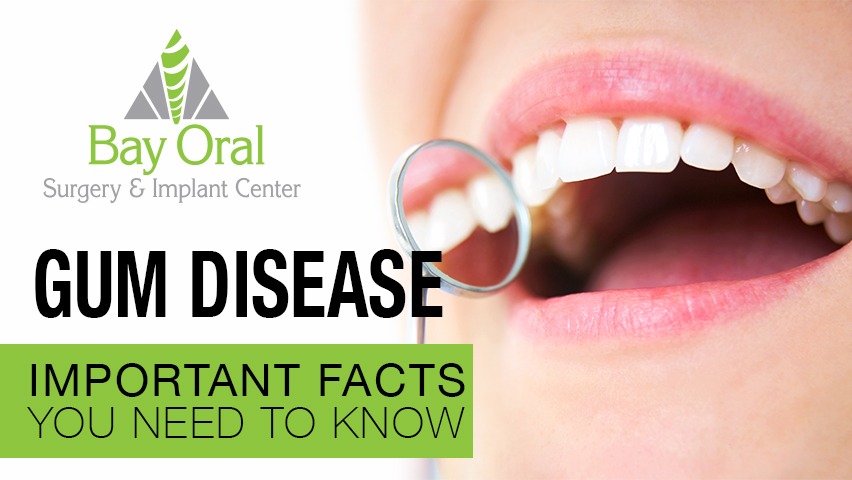
by Bay Oral Surgery | May 15, 2019 | Blog

According to findings from the Centers for Disease Control and Prevention (CDC), one out of every two Americans aged 30 and older has periodontal disease, also known as gum disease. This means that approximately 64.7 million Americans are affected, so it’s now more important than ever to understand the facts behind this growing epidemic, the causes & risk factors, and how to treat it.
What is Gum Disease?
Gum disease is an inflammation of the gums that can progress to affect the bone that surrounds and supports your teeth. The two most common types are gingivitis and periodontitis. The mildest form of this disease is gingivitis, which causes the gums to become swollen, red, and bleed easily. If gingivitis is left untreated, it can advance to periodontitis. Periodontitis is a serious gum infection that damages the soft tissue and destroys the bone supporting your teeth. Gums begin to separate from your teeth and form pockets that become infected, which can lead to tooth loss.
Causes & Risk Factors
The main cause of periodontal disease is improper oral hygiene, but other factors affect the health of your gums as well. Below are some of the most common risk factors:
- Tobacco – Smoking cigarettes or chewing tobacco prevents the gum tissue from being able to heal properly.
- Alcohol – Consuming alcohol regularly tends to increase plaque levels on your teeth due to the sugar content in alcohol. Additionally, alcohol causes dehydration and dry mouth, which reduces saliva flow and increases the risk of tooth decay.
- Diabetes – Diabetes causes blood vessels to thicken, slowing the flow of nutrients and the removal of harmful wastes, which weakens the resistance of gum and bone tissue to infection. When diabetes is poorly controlled, high glucose levels in your saliva may help germs grow and set the stage for gum issues.
- Nutrition – Diets that are high in sugar and carbohydrates will increase the formation of plaque, and a deficiency of important nutrients such as vitamin C will impair healing.
- Aging – Studies show that the senior population has the highest rate of periodontal disease, with 70% of Americans over the age of 70 experiencing periodontitis.
- Stress – Many studies have been conducted that link stress as a factor in fighting off infections such as periodontal disease.
- Teeth Clenching & Grinding – Clenching or grinding your teeth can put excess force on the supporting tissues of the teeth and could speed up the rate at which these periodontal tissues are destroyed.
- Puberty & Hormones – Women have an increased sensitivity to oral health problems because of the unique hormonal changes they experience. These hormonal changes not only affect the blood supply to the gum tissue, but also the body’s response to the toxins that result from plaque build up.
- Medications – Many medications can cause a reduction in saliva, which is necessary to help prevent infection and tooth decay. Some medications for allergies, high blood pressure, and depression are known to reduce saliva flow.
Gum Disease Treatment
Treatment options will vary depending on the symptoms and stage of your infection. The goal is to control your infection and consult your dentist for the right treatment plan for you. To learn more about gum disease and the treatment options available to you, consult with your dentist or find a dentist near you on our website.
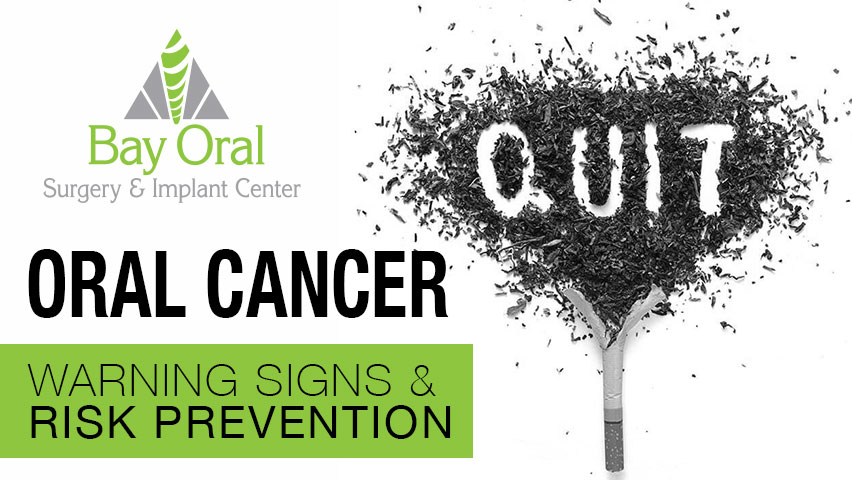
by Bay Oral Surgery | Apr 15, 2019 | Blog

Oral or oropharyngeal cancer kills roughly one American every hour. Since April is Oral Cancer Awareness Month, now is a good time to reflect on the sobering statistics and focus on prevention.
Risk factors
Tobacco and alcohol: Although lifestyle and other factors can contribute to oral cancer, people who use tobacco and alcohol consumption are at the greatest risk. And, when tobacco use and heavy drinking are combined, the risk becomes even greater. According to the Oral Cancer Foundation, a combination of the two behaviors appears to have a synergistic effect that increases risk.
Diet: What you eat may also play a smaller role in oral cancer. Studies have shown that a diet rich with fruits and/or vegetables has been associated with a decreased risk of oral or when compared with lower consumption.
HPV: Approximately 12,000 Americans ages 15 to 24 are infected with HPV every day. This is a frightening statistic considering that oropharyngeal cancers, mostly in the tonsil areas and base of the tongue, are primarily caused by the HPV virus. Testing positive for HPV doesn’t guarantee you will get the disease, but it is a significant risk factor.
Warning signs and prevention
Unfortunately, oral cancer can be difficult to detect in early stages, so patients may not recognize symptoms until the disease has progressed. In fact, a little more than half of patients diagnosed with oral cancer will still be alive in five years. According to Mayo Clinic, these are some things to watch out for:
- A lip or mouth sore that doesn’t heal
- A white or reddish patch on the inside of your mouth
- Loose teeth
- A growth or lump inside your mouth
- Mouth pain
- Ear pain
- Difficult or painful swallowing
Oral cancer is preventable. Quitting tobacco use is the best way to reduce your risk of oral and many other kinds of cancer. Other lifestyle changes, including reduced alcohol consumption, a healthy diet and avoiding sun exposure/wearing lip balm with sunscreen can also reduce risk. Make sure you get an oral cancer screening at every regular dental check-up. If you experience symptoms that don’t go away, tell your dentist immediately.
Visit www.oralcancerfoundation.org to learn more about free screenings or how you can get involved. Or, contact us at Bay Oral to schedule an appointment.
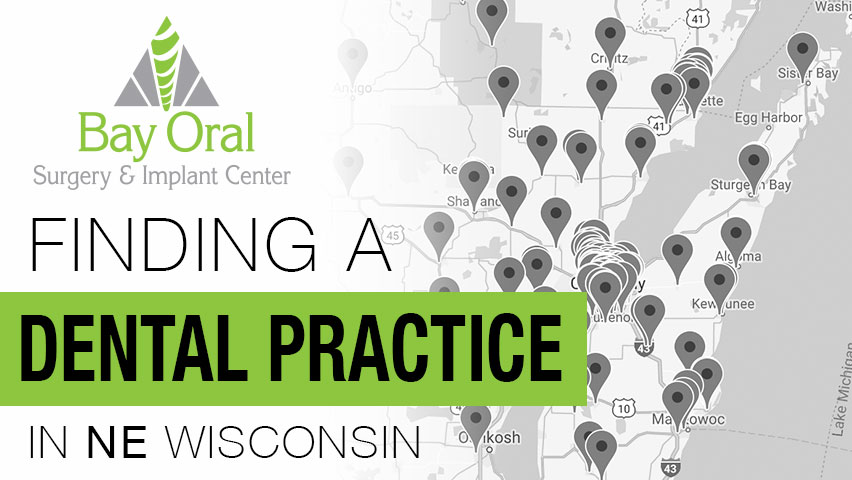
by Bay Oral Surgery | Mar 14, 2019 | Blog

Whether your trusted family dentist is retiring or you’re moving to a new community and need to seek out a new dental practice, finding the right provider can be a daunting undertaking. After all, you only get one permanent set of teeth in your lifetime, so it’s extremely important to have an oral healthcare partner you can trust. The following tips will help you choose a new provider with confidence.
Word of mouth
No pun intended, but your friends, family and co-workers know you best and their recommendations can save you a lot of time vetting dental practices that may not be the right match. If you’re looking for a dentist in your current location, your family doctor may be able to make suggestions. If you’re relocating, ask your dentist to make a recommendation.
Getting to the root of your needs
The American Dental Association recommends that you visit more than one dentist before making a decision. Making a list of questions in advance will help you quickly extract the information you need to make your choice.
Consider what is most important to you. For example, if you’re a busy working parent on the go, flexible, convenient office hours and close proximity to home may be a priority. Be sure to ask about the dentist’s policy on late cancellations or missed appointments.
A dental practice with an updated website that contains helpful patient information and a user-friendly portal can be a real time-saver as well. Find out if you can ask questions, schedule appointments and pay bills online.
If you have anxiety about dental treatments, then you may want to inquire about anesthesia and sedation. Or, if cost is a factor in your decision, then you’ll want to be sure that you only visit dental practices that are in your insurance network and are transparent about fees and payment plans.
Give your next dentist a thorough exam
You’ll also want to be certain that your next dentist is properly credentialed and is someone who will make you feel comfortable in the dentist’s chair. Most dental practices have an “About Us” page on their website where you can read more about the dentists’ educational background, interests and hobbies. You also can call the front desk and inquire about services and appointments. If the person answering the phone is helpful and courteous, that’s a good indication that the practice’s environment is friendly and welcoming.
Now that you know what to look for, visit our “Find a Dentist” page and let us help you find your next perfect dentist!

by Bay Oral Surgery | Feb 15, 2019 | Blog
It can be hard to smile about a delicious ice cream or steaming cup of hot cocoa when you have sensitive teeth. This common problem also may make it difficult to maintain proper oral hygiene, as flossing and brushing sensitive teeth can be a painful experience. Fortunately, you don’t have to accept living with touchy teeth.
What causes sensitive teeth?
There are many potential reasons for tooth sensitivity. Gum disease is a frequent cause, so taking good care of your teeth and gums is extremely important for prevention and treatment. Your oral healthcare provider can help you determine other underlying causes of pain, including worn tooth enamel, cavities, fractured teeth, and fillings that need to be replaced.
You also may be doing things in your daily life that cause or aggravate sensitive teeth. Consider the following:
- Think twice before you crunch on ice, as that can damage the enamel on your teeth or cause your teeth to crack.
- If you are an overzealous brusher or flosser, you may be doing more harm than good to your gums. Try using a soft bristled toothbrush and a gentler approach to oral hygiene.
- If you plan to whiten your teeth, make sure you first discuss with your oral healthcare provider and follow directions carefully.
Treating sensitive teeth
Once you determine the cause of your tooth sensitivity, you can work with your oral healthcare provider on developing a treatment plan, which may include something as simple as desensitizing toothpaste or fluoride mouthwash and/or treatment. If you grind your teeth, you may want to consider a mouth guard to protect the tooth enamel.
In other instances, dental fillings, bonding or crowns may be necessary to restore decayed or damaged teeth. If your tooth cannot be restored, a dental implant may be the best solution to ensure that the replacement tooth is fully supported. Dental implants help to maintain the integrity of both your jaw and your surrounding teeth, assisting in the prevention of further oral health problems.
While sensitive teeth can be a real pain, you don’t have to settle for a life without hot fudge sundaes or steaming café lattes. Talk to your oral healthcare provider about the best treatment plan to relieve and alleviate sensitive teeth.







